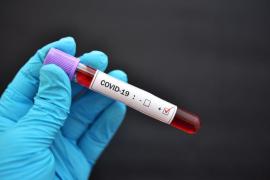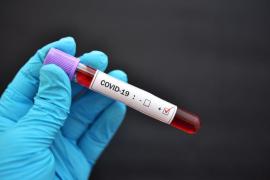
JOHANNESBURG, June 11 (NNN-SANEWS) — South Africa is closely monitoring the emergence of a new COVID-19 variant, known as Nimbus or NB.1.8.1, associated with a rise in cases in certain regions of Asia.
This is according to Health Minister Dr Aaron Motsoaledi, who addressed the 4th Health Working Group meeting of the Group of 20 (G20), which is underway in Johannesburg.
Motsoaledi said the World Health Organisation (WHO) has designated this “a variant under monitoring” due to its growing presence.
India is the latest country to experience a surge in new COVID-19 cases due to the emergence of the new variant, NB.1.8.1.
According to the Independent, infections have been confirmed in several Asian countries, including Thailand, Indonesia and China.
In addition, the United Kingdom Health Security Agency reported the first 13 cases of this variant in England last week.
“I wish to reassure this esteemed gathering that South Africa has robust surveillance systems in place.
“Our National Institute for Communicable Diseases (NICD) manages a comprehensive sentinel surveillance programme that systematically tests for key respiratory viruses, including SARS-CoV-2, influenza, and RSV. Currently, our data show very low SARS-CoV-2 activity,” Motsoaledi explained.
South Africa is currently experiencing a seasonal rise in influenza, but the country is well-prepared to manage the situation, he said.
“Crucially, the new variant remains a descendant of the Omicron lineage. This means that current recommendations for updated SARS-CoV-2 vaccines are still effective. Therefore, at this stage, no specific new public health actions are required from the public.”
Motsoaledi said government continues to promote good hygiene practices, including handwashing, covering coughs, and staying home when feeling unwell.
“These simple measures are effective in reducing the spread of all respiratory illnesses. We will continue to monitor the situation closely through our established networks and will report any significant changes.”
Meanwhile, he called on the attendees of the meeting to work together with “renewed urgency and unwavering resolve”.
“Let us build a future where solidarity, equity, and cooperation are the cornerstones of our global health architecture.”
The week-long Health Working Group meeting began on Tuesday and will conclude on Friday.
It brings together health leaders, experts, and policymakers from the world’s largest economies, invited nations, and international organisations.
The plenary sessions will build on lessons learned from the COVID-19 pandemic and address ongoing barriers to accessing countermeasures, particularly in low- and middle-income countries.
There will be a focus on prioritising the expansion of local and regional manufacturing capacity, especially in regions like Africa.
Delegates will also explore opportunities for technology transfer, sustainable financing, and regulatory alignment to ensure timely and equitable access to life-saving tools during health emergencies. – NNN-SANEWS




